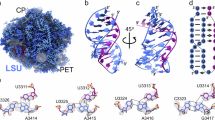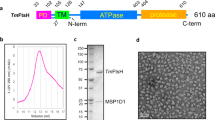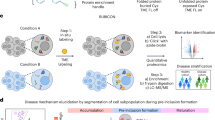Abstract
THE presence of proteolytic enzymes in Entamoeba histolytica has been suspected for many years and the extracellular secretion of these enzymes has been put forward by many authors as an explanation of the mechanism of tissue invasion by this parasite1. Experimental evidence of their occurrence in E. histolytica has been presented by several authors2, though a detailed study of them has not been made.
This is a preview of subscription content, access via your institution
Access options
Subscribe to this journal
Receive 51 print issues and online access
$199.00 per year
only $3.90 per issue
Buy this article
- Purchase on SpringerLink
- Instant access to full article PDF
Prices may be subject to local taxes which are calculated during checkout
Similar content being viewed by others
References
Anderson, H. H., Bostock, W. L., and Johnstone, H. G., “Amebiasis” (C.C. Thomas, Illinois, 1953).
Balamuth, W., and Thompson, P. E., “Comparative Studies on Amebae and Amebicides”, in “Biochemistry and Physiology of Protozoa”, 2, edit. Hunter, S. H., and Lwoff, A. (Academic Press, New York, 1955).
Holter, H., and Løvtrup, S., C.R. Lab. Carlsberg, Chim., 27, 27 (1949).
Author information
Authors and Affiliations
Rights and permissions
About this article
Cite this article
NEAL, R. Proteolytic Enzymes in Entamoeba histolytica . Nature 178, 599 (1956). https://doi.org/10.1038/178599a0
Issue date:
DOI: https://doi.org/10.1038/178599a0
This article is cited by
-
Casease in Entamoeba histolytica
Nature (1959)
-
Occurrence of Glutaminase in Endamoeba histolytica
Nature (1957)



